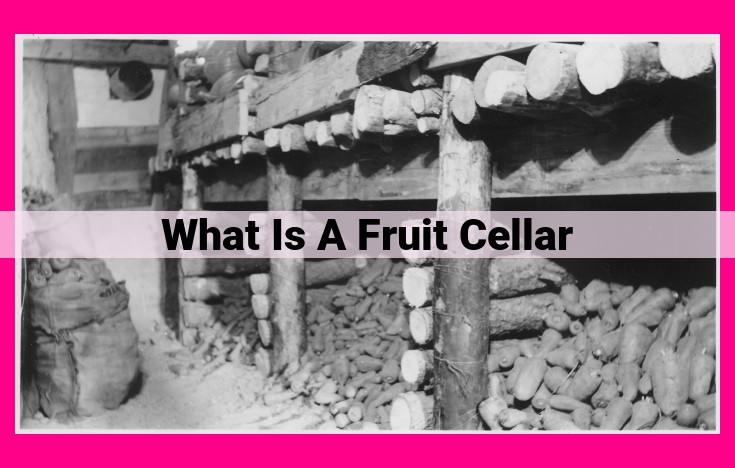Optimizing Fruit Storage: A Comprehensive Guide To Creating A Fruit Cellar

A fruit cellar is a specialized underground storage facility designed to preserve the quality and extend the shelf life of fruits. It consists of walls, floors, ventilation systems, and temperature and humidity controls to maintain optimal storage conditions for various fruit varieties. Each type of fruit has specific storage requirements, and careful management is crucial to preserve their freshness and prevent spoilage.
Cellar Infrastructure: The Bedrock of Fruit Storage
Fruit storage, a delicate art of preserving nature’s bounty, relies heavily on the infrastructure of the cellar. It’s the bedrock upon which successful storage rests. A well-equipped cellar forms the foundation, safeguarding your fruits from the ravages of time and preserving their peak quality.
Essential Elements of a Fruit Storage Cellar
1. Walls and Floor:
Robust walls and a moisture-proof floor are crucial. Insulated walls shield the cellar from temperature fluctuations, while a sealed floor prevents moisture penetration.
2. Ventilation:
Adequate ventilation ensures proper airflow to prevent stale air and ethylene buildup. Exhaust fans and vents promote air circulation, maintaining optimal conditions for fruit preservation.
3. Temperature and Humidity Control:
The cellar’s temperature and humidity must be meticulously controlled. Refrigeration systems maintain precise temperatures, slowing down ripening. Humidifiers and dehumidifiers ensure optimal humidity levels to prevent dehydration or spoilage.
4. Shelving and Storage Containers:
Sturdy shelving keeps fruits organized and prevents bruising. Specialized storage containers protect fruits from each other and minimize handling damage. Choose ventilated containers to facilitate airflow and slow down deterioration.
5. Access Accessories:
Convenient access to fruits is essential. Ladders, step stools, and platforms enable easy reach. Doorways should be wide enough for easy movement of fruits and equipment.
Fruit Storage: A Delicate Balance for Every Variety
In the realm of fruit preservation, it’s not just about keeping your prized produce fresh but about providing each variety with its own unique haven. Each fruit has its own delicate requirements, a specific symphony of temperature, humidity, and duration that unlocks their peak flavor and extends their longevity.
Apples
These crunchy favorites appreciate a crisp and cool sanctuary, where temperatures hover around 30-34°F. They prefer moderate humidity levels of 85-90% to maintain their crispness. Stored properly, apples can keep their charm for up to six months.
Pears
Pears, on the other hand, prefer a slightly warmer embrace. They thrive at temperatures between 30-32°F and thrive in slightly higher humidity levels of 90-95%. Their tender flesh requires extra care, and they generally store well for two to four months.
Citrus Fruits
These vibrant orbs of sunshine, including oranges, grapefruits, and lemons, crave a warm and bright environment. Temperatures between 55-60°F and humidity levels around 85-90% nurture their zesty flavor. They can maintain their juice and vitality for one to three months in these optimal conditions.
Berries
Berries, with their delicate and fragile nature, demand exceptional care. They relish in cool and highly humid environments. Store them at around 32-36°F with humidity levels between 90-95%. Their fleeting presence means they should be enjoyed within a few days.
Stone Fruits
Peaches, cherries, and plums, the epitome of summer’s sweetness, prefer a cold and humid haven. Temperatures between 30-32°F and humidity levels of 85-90% protect their velvety flesh. They, too, have a finite lifespan of a few weeks to a month.
Grapes
Grapes, with their cascading clusters, desire a cool and moist refuge. Preserve their crisp and sweet nature at temperatures between 30-34°F and humidity levels of 90-95%. They can adorn your fruit bowl for up to four weeks.
Melons
These aromatic and juicy giants require a warm and well-ventilated sanctuary. Temperatures between 45-50°F and humidity levels around 80-85% allow them to ripen fully and maintain their delectable flavor for several weeks.
Storage Management: Preserving Quality and Extending Shelf Life
When it comes to storing fruits, meticulous care is paramount to safeguard their quality and extend their shelf life. Understanding the intricacies of fruit storage management is crucial for preserving the vibrant flavors and nutritional value that nature has bestowed upon these delectable treats. In this comprehensive guide, we’ll delve into the key factors that influence fruit storage and empower you with practical strategies to keep your fruits fresh and brimming with goodness.
Maturity Matters: The Art of Ripeness
The journey towards optimal fruit storage begins with selecting fruits at the ideal ripeness. Green and unripe fruits may continue to mature during storage, while overripe fruits are more susceptible to spoilage. Aim for fruits that possess a firm texture, vibrant color, and a subtle hint of give when gently pressed. This delicate balance ensures the best possible storage experience.
Time is of the Essence: Optimal Storage Durations
Every fruit variety has a unique lifespan in storage. Apples and pears thrive in cool, humid conditions for weeks or even months. Citrus fruits, on the other hand, prefer slightly warmer temperatures and can last for several weeks. Berries and stone fruits are more delicate and require prompt consumption or storage in refrigerators for a few days at most. Understanding these optimal storage durations is essential to maximize the enjoyment of each fruit’s peak flavor.
Temperature and Humidity: A Delicate Dance
Fruits are highly sensitive to temperature and humidity fluctuations. Maintaining specific ranges for each fruit type is key to preserving their freshness. Apples thrive in temperatures around 32-38°F (0-3°C) with humidity levels between 85-90%. Pears prefer slightly higher temperatures of 36-40°F (2-4°C) and humidity around 90%. Citrus fruits can withstand warmer temperatures of 45-50°F (7-10°C) and lower humidity levels of 70-80%.
Ethylene: The Invisible Enemy and Subtle Ally
Ethylene, a naturally occurring plant hormone, plays a significant role in fruit ripening and deterioration. Some fruits, such as apples and pears, are highly ethylene-sensitive and can quickly overripen in its presence. Other fruits, like bananas and avocados, benefit from exposure to ethylene as it accelerates their ripening process. Understanding the ethylene sensitivity of different fruits and implementing strategies to minimize its impact is crucial to prolong storage life.
By mastering the art of fruit storage management, you can savor the bountiful harvest of nature’s sweet offerings for longer. Whether it’s preserving the crisp crunch of apples, the juicy sweetness of berries, or the tangy zest of citrus fruits, this guide will empower you to enjoy the freshest and most flavorful fruits all season long.





